Province confirms whooping cough outbreak
Prince Edward Island is currently experiencing an outbreak of whooping cough (pertussis).
Symptoms include sneezing, runny nose, fever, and gradually worsening cough that often ends with a “whooping” sound that can cause the person to vomit. There are currently 10 cases of whooping cough in Prince Edward Island; the Island’s last pertussis outbreak was in 2014.
“Whooping cough is easily spread from person to person through coughing, sneezing, and close contact,” said Chief Public Health Officer Dr. Heather Morrison. “Getting immunized is the best way to avoid being infected and spreading the disease to others in your family or community.”
Although anyone can contract whooping cough, it is of particular concern in newborns as they can become extremely ill and develop serious complications. Infants in Prince Edward Island are routinely immunized against whooping cough at ages 2, 4, 6 and 18 months. It is only after these four doses are given that an infant has received the best possible protection against the illness. Booster doses are also offered at age 4 and in grade 9.
Pertussis is considered a vaccine-preventable disease and immunization remains the best way to protect against infection. Prince Edward Island offers a free booster dose to parents of newborns and any close contacts whose immunization is not current. A booster dose of this immunization in adulthood is also recommended for all persons and offered free at Health PEI public health nursing office.
Individuals exhibiting symptoms of whooping cough are encouraged to contact their health care provider.
Backgrounder
What is whooping cough (pertussis)?
Pertussis, also known as whooping cough, is a serious infection of the lungs and upper airway that is caused by the Bordetella Pertussis bacterium. The bacterium can be present in the nose and throat of people of all ages.
What are the symptoms?
It starts with cold-like symptoms like a runny nose, low fever, coughing and sneezing. Within one to two weeks, the cough becomes severe and occurs in coughing spells. Often it ends with a whooping sound and it can sometimes cause the person to gag or vomit due to the thick mucus being produced. It can be difficult to breathe. The cough lasts several weeks and is often worse at night.
How is it spread?
It is spread easily from person to person by coughing, sneezing and close contact. Whooping cough is especially dangerous for infants.
Why is it on the rise?
Even though many people have been immunized as children, their immunity becomes reduced in adulthood and they are more likely to develop the infection and transmit it to others. You do not develop lifelong immunity, so someone who has had the illness or has not had a booster dose of the vaccine can get it again.
What is the routine immunization against pertussis?
Babies are immunized at the 2, 4, and 6 months visits at Public Health Nursing clinics and receive a booster at 18 months. At that time, your baby will have received the best protection possible.
Booster doses are offered at 4 years and again in Grade 9. A dose of pertussis containing vaccine is recommended in adulthood to all persons.
Why is pertussis dangerous for babies?
The disease can be life threatening to babies and young children. Newborns are too young to receive the vaccine and they do not get adequate protection until they have received four doses of vaccine by age 18 months. Young children, especially infants, can become extremely ill and develop serious complications like pneumonia, difficulty breathing, convulsions and permanent brain damage. Infants can die from the disease even if they are treated with antibiotics or cared for in hospital.
How can you protect your baby?
The best way to protect your baby is to ensure your family’s immunization is to up to date. You should also ensure other close contacts to your baby are also immunized. This includes your baby’s siblings, grandparents and any other adults who will be in close contact with you or your baby. Your baby is less likely to become ill if those around him/her are protected. A free, safe and effective vaccine is available and safe to receive during pregnancy (during an outbreak it is offered during the third trimester) and while breastfeeding. After you have delivered your baby you will be offered this vaccine to boost your immunity. The vaccine is safe to receive by breastfeeding mothers. The baby’s parents and other significant caregivers can go to the Health PEI Public Health Nursing office in your community to receive the vaccine.
Is there a treatment?
Antibiotics are offered to people who have been confirmed to have pertussis. Antibiotics reduce the contagiousness of the disease. After 5 days of antibiotic treatment, a person is no longer considered to be contagious even though symptoms may persist. Untreated cases are considered to be contagious for up to 21 days after the cough starts.
What if I have contact with someone who has confirmed pertussis?
Contacts who are considered at risk for complications, including infants less than one year of age and pregnant women in their third trimester, will be offered antibiotics to reduce the chance of developing the illness.
All contacts who are not fully immunized and who can be immunized may be offered the vaccine through HPEI Public Health Nursing.
Media contact:
Autumn Tremere
Health and Wellness
agtremere@gov.pe.ca
902-368-5610


